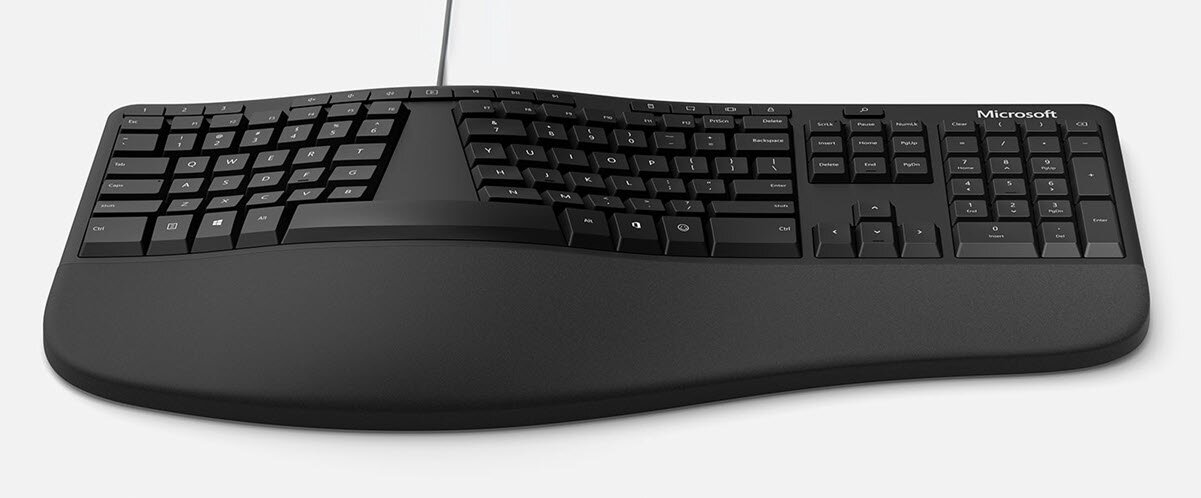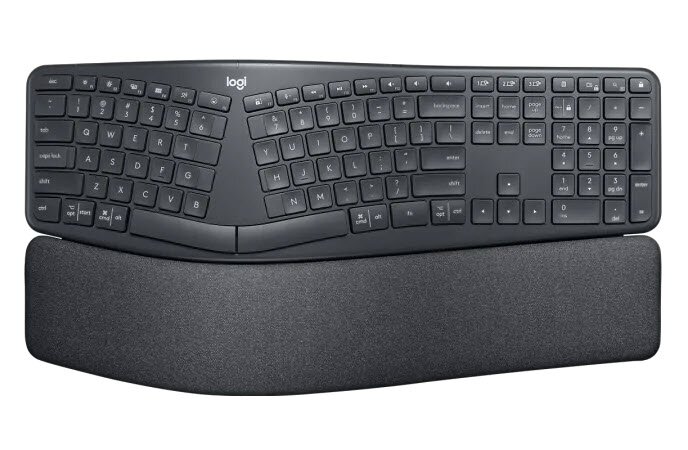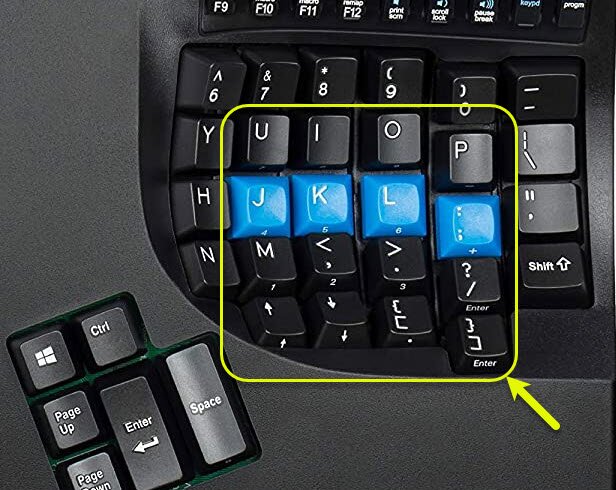This article rounds up the latest and best ergonomic keyboard designed to reduce the strains on hands, wrists and arms after prolonged hours of typing.
Microsoft designed the first ergonomic keyboard in 1994 and called it the “Natural Keyboard”.

As we shall see, the modern ergonomic keyboard layout looks quite similar to the Gen 1 with a curve panel and split keyframe, albeit there are new features such as Bluetooth, multi-device connection and media keys, etc.
Microsoft Sculpt Ergonomic Keyboard

| Pros | Cons |
|
|
Microsoft launched the Sculpt Ergonomic keyboard in August 2013, and it is still available for ordering today. Designed in 2013, it is not surprising that it does not have Bluetooth, multiple device connection capabilities. However, it has a long battery life of 36 months and a detached Numpad, which you can place on either side of the keyboard. The detached Numpad is a smart design but yet few manufacturers adopt the same design.
Read more: 3Dconnexion Keyboard Pro with detached Numpad
The Microsoft Sculpt Ergonomic Keyboard, including the detached Numpad and mouse, is available as a set. The USB dongle is inside the battery compartment of the mouse. The keyboard has 104 keys, including 84 on the keyboard and 20 on the detached Numpad. The Sculpt Ergonomic Mouse is basic, with only a single side button programmed for the Windows start button.
The removable riser leg only allows a single tilt angle.
Buy Microsoft Sculpt Ergonomic Keyboard
Microsoft Ergonomic Keyboard


| Pros | Cons |
|
|
Microsoft launched the new Ergonomic keyboard in 2019, with a more conventional look and a wired USB Type-A connection. Like the Microsoft Sculpt Ergonomic, the removable riser leg only has a single tilt angle. Since the keyboard design uses a wired connection, they should have swapped the USB Type A to Type C connection and increased the power supply to support backlit keys.
The main selling point for this keyboard is not just the ergonomic design but also the additional 22 keys for media and volume control, calculators, emoticons and windows functions.
Buy Microsoft Ergonomic Keyboard 2019
Logitech Ergo K860 Keyboard


| Pros | Cons |
|
|
Logitech’s K860 is a full-sized keyboard with a curved design and split key layout. We would prefer the keys with backlights. and that both the wrist-rest and Numpads are modular in design and detachable. A fully modular design would also allow the curvature and split keyboard angle adjustments. Unfortunately, we could not find any ergonomic keyboard that meets all these requirements.
Buy Logitech Ergo K860 Keyboard
Kensington Pro Fit Ergonomic Wireless Keyboard

| Pros | Cons |
|
|
The significant advantages of the Kensington Pro Fit Ergonomic Wireless Keyboard are the spill-proof keys design and 128-bit AES encryption. The spill-proof design is qualified based on MIL-STD-810H Method 504.3 Contamination by Fluids testing for resistance to breakdown when exposed to cleaning and disinfecting solvents such as alcohol and bleach for at least 24 hours.
The keyboard layout is a standard 104-key style with no extra keys, but they include the media function keys with the F1 to F12 keys via the FN key. For users who do not require multi-device connection capability, the Kensington Pro Fit Ergonomic Wireless Keyboard could be a better option than the Logitech K860 and Microsoft Sculpt.
Buy Kensington Pro Fit Ergonomic Wireless Keyboard
Kinesis Advantage2 Ergonomic Keyboard (KB600)

| Pros | Cons |
|
|
This keyboard uses standard mechanical keys with 4mm total travel and 2mm actuation distance. Users can select between the linear red switches with an operating force of 45 cN or tactile brown switches with an operating force of 55 cN. Both options are quiet without a clicky sound.
Read also: Logitech ERGO K860 Vs Microsoft Sculpt Ergonomic Keyboard.
The Kinesis Advantage2 Ergonomic keyboard requires a longer learning curve than the standard split keyboard because of the bottom-centre position of the backspace, navigation, CTRL, ALT, and ENTER keys. Another potential issue is the space bar on the right-hand side only, with no separate Numpad.
However, a “built-in” Numpad shares with the other keys in the photo below, with tiny numbers printed on the side of the keycaps. They are pretty hard to see and may require some time to get used to.

Buy Kinesis Advantage2 Ergonomic Keyboard (KB600)
Dygma Raise Ergonomic Split Keyboard[tie_index]Dygma Raise Ergonomic Split Keyboard[/tie_index]

| Pros | Cons |
|
|
The Dygma is probably the first ergonomic, compact keyboard designed especially for gamers with customisable RGB backlights and mechanical keys. It is the only keyboard in our review that allows full customisation to suit the wrist angle.
Read also: How to Select Different Styles of Keyboard Layout

Most avid gamers should be familiar with mechanical keys and know that there are basically three types, namely linear, tactile and clicky. In addition, Dygma offers up to 8 different mechanical keys with different choice of operating force, activation point and total travel distance. We like quiet keys with short travel, so our favourite is the Speed Silver switches, quiet linear switches with a moderate actuation force of 40cN force at 1.1mm activation, and 3.5mm full travel.

Regarding ergonomic design, the Dygma can be tilted and turned (tented) at any desired angle to suit individual needs. There could still be a short learning curve as your left hand could not cross over to the right side keyboard, and vice versa. However, the split line is quite well designed based on the index finger at the traditional F and J keys, and the split naturally between the G and H keys.

The cons we have listed are mostly our own opinion, and the only thing stopping us is the price! Nevertheless, for gamers who play games for long hours, ergonomic keyboards would be worth the price in the longer term, especially to reduce the risk of getting Carpal Tunnel Syndromes.
Read also: 3Dconnexion Keyboard Pro vs Logitech MX Keys






